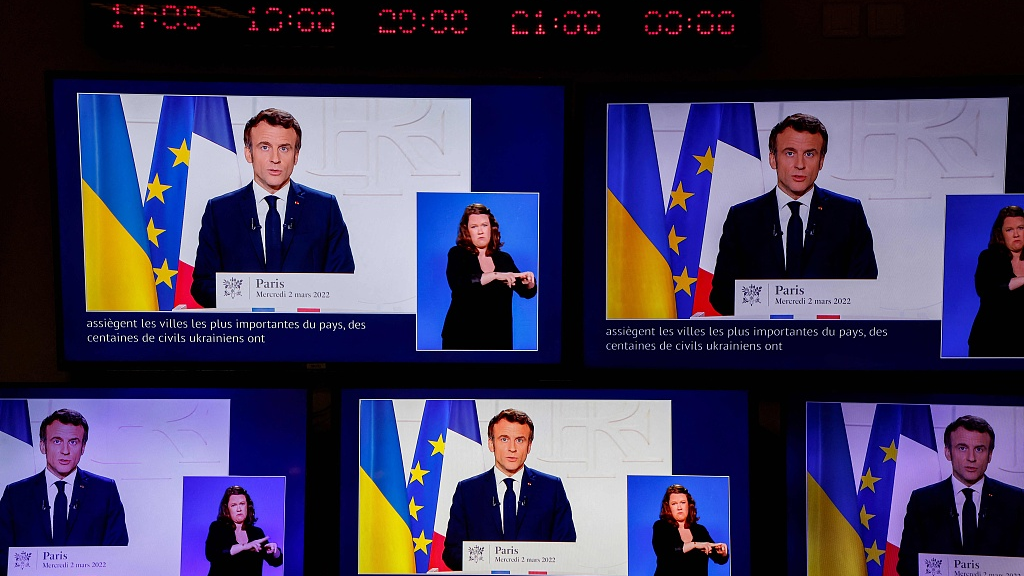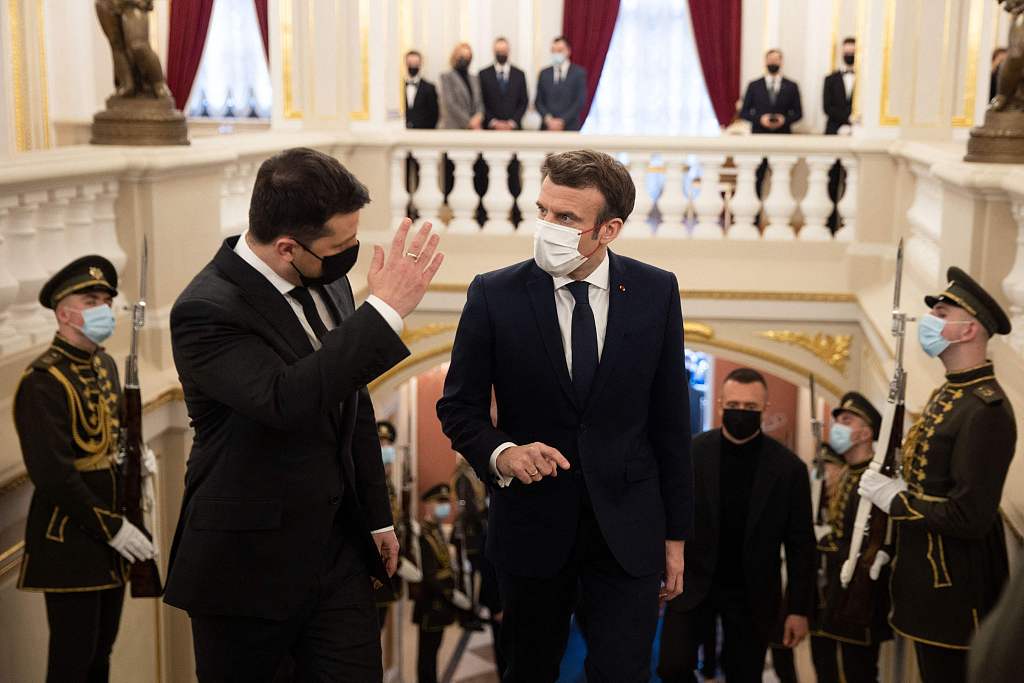
A picture of monitors taken in a media control room shows French President Emmanuel Macron speaking from the Elysee Palace during a televised address on the general situation, in Paris, France, March 2, 2022. /VCG
A picture of monitors taken in a media control room shows French President Emmanuel Macron speaking from the Elysee Palace during a televised address on the general situation, in Paris, France, March 2, 2022. /VCG
Editor's note: Song Xin is a global affair consultant at Zhou & Masters and former policy advisor at the European Parliament. The article reflects the author's opinions, and not necessarily those of CGTN.
With Emmanuel Macron's declaration for president candidacy on Thursday, France is gearing up for its first round of presidential elections scheduled for April. Did the Ukraine crisis disrupt the French elections? Absolutely not, but this brutal event did shape the presidential race.
France was supposed to play a big role in this Ukraine crisis not only because of the importance of France as an actor in the Europe Union and its rotating presidency of the EU Council from January to June 2022, but the fact that France has a history dealing with Russia.
During the war in 2008 between Georgia and Russia, then French President Nicolas Sarkozy played the role of mediator between the two sides. Thanks to his efforts, the two sides signed a ceasefire agreement five days after the beginning of the war. Europe avoided being confronted with a lengthy war in 2008. President Emmanuel Macron obviously failed to carry on French diplomatic tradition: Despite his earlier and current efforts to communicate with Vladimir Putin, Russia didn't have any intention to change their military operation plan.
But Macron's failure in preventing the war didn't make him less popular in France, the wartime context, on the contrary, gave him more credibility as French President. Politically speaking, it is near a wartime tradition that the people are more likely to be united behind the current government to respond to the overall challenge, no matter how poorly the government has performed. This is the last thing that the other presidential candidates spanning from far-left to far-right would like to see.

Ukrainian President Volodymyr Zelenskyy (L) and French President Emmanuel Macron walk up stairs before their meeting in Kyiv, Ukraine, February 8, 2022. /VCG
Ukrainian President Volodymyr Zelenskyy (L) and French President Emmanuel Macron walk up stairs before their meeting in Kyiv, Ukraine, February 8, 2022. /VCG
How to project the relations with Russia or with President Putin has become a key issue in the current election campaign. Some of the candidates, such as the far-right one Marine Le Pen and the newcomer Eric Zemmour, were trying to use Macron's failed diplomatic communication as a tactic to kill Macron's credibility. It didn't work.
On the contrary, their past support for Putin and for Russia's Europe strategy put them in the center of critics, which made them look naive and incompetent for their foreign strategy proposal. Having seen the ineffectiveness of the tactic, some presidential candidates are trying to ditch themselves from the pro-Russia camp. However, their rivals didn't leave it alone.
Not only on the far-right side, but on the leftist side the candidates are also facing some Ukraine dilemma, especially for Jean-Luc Mélenchon, candidate of France Insoumise, whose previous anti-NATO and anti-America narratives brought him some troublesome criticism today even from his own party. Just before the Ukraine crisis, he proposed that France should leave the North Atlantic Treaty Organization and restore their own national military sovereignty. He pointed out clearly that an anti-Russian policy is not in line with France's interests — such a course is dangerous and absurd. He asked, "Why do we have to protect Ukraine's borders?" Even though his reflection might sound logical in the peacetime, it is now seen by his own supporters more as an irresponsible response to the Ukraine crisis.
President Macron's last-minute declaration for presidential elections is clearly not an accident. Unlike the other candidates who might be still struggling to meet the "parrainage" requirement of collecting the 500 sponsorship letters from mayors, Macron's last-minute registration is pure strategic. The most efficient way for him to gain the elections is not to run into heated debates with the other rivals but to wait until his biggest threat — Marine Le Pen — to be put down by the others for her pro-Russia position. Then he can come up with his plan to defend the interests of France and also the EU.
As he pointed out in his letter to all the French citizens, "I am a candidate here with you to create a French and European reply to the challenges of the century." He hopes "to defend our values threatened by the deregulation of the world".
Apparently, the Ukraine conflict is shaping the campaign in a way nobody had ever expected. And to certain extent it is helping President Macron to sweep up his path to re-election.
(If you want to contribute and have specific expertise, please contact us at opinions@cgtn.com.)

